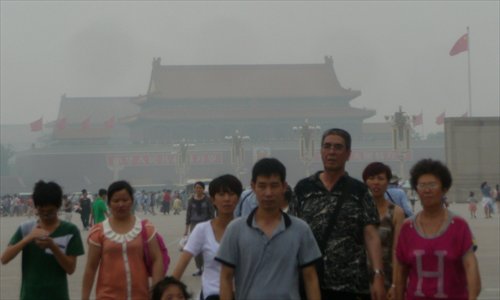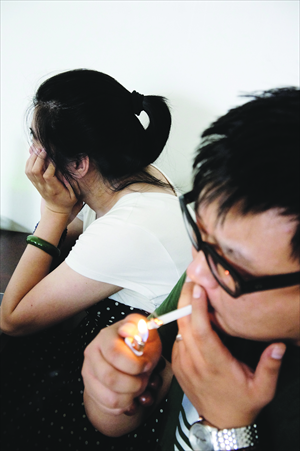HOME >> METRO BEIJING
Rate of ignorance
By Yin Yeping Source:Global Times Published: 2013-7-23 18:38:01

Chinese scientists plan new studies to clarify the link between air pollution and cancer. Photo: CFP

The number of people with cancer has jumped by nearly half in the last decade. Photo: Li Hao/GT
Wang Lin, 36, was not a heavy smoker. Yet in 2012 he was diagnosed with cancer at a local hospital. Just a year after the diagnosis, he passed away. His wife Liu is still unable to believe he died so young.
According to Liu, the doctor said that the cause of his lung cancer was smoking. Yet to her, there was more to it than that. "He started smoking for just a few years and only smoked about one to two cigarettes per day," she said. Liu said that she suspected her husband's cancer has to do with the air pollution. "His job required him to do outdoor activities quite often, exposing him to the polluted air all day every day," she said. Yet she has no way to prove her suspicion, and the reason Wang caught cancer at such a young age is not clear.
Wang was just one of a growing group of cancer victims in Beijing. In the decade starting in 2001, the cancer morbidity rate jumped by 48 percent, according to the Beijing Residential Health Report released earlier this year by the Beijing Municipal Health Bureau (BMHB).
The report also shows much lower cancer rates in the suburbs than in built up areas of the city and areas with industry.
The report said that three-quarters of Beijing residents have little sense of a healthy lifestyle, which partly explains the high cancer rates. The report also states Beijingers are too passive about changing their behavior and lifestyle to reduce the risk of getting chronic disease.
But environmentalists and health experts said that requesting residents to change their lifestyle is ignoring the main point - environmental pollution is a major cause of the higher cancer rates in Beijing.
Inadequate health sense
For the first time, the annual cancer report this year stated that the population that has an inadequate notion of how to keep good health, contributing to annual cancer deaths. Wang Ning, vice director of the Beijing Institute for Cancer Research under the Beijing Cancer Hospital, who participated in the launching of the report, said that over 20 percent of the cases of cancer could have been cured through early diagnosis and treatment if people would pay more attention to their health. "Given this context, how are we supposed to convince them what can be done and what cannot be done for the sake of their health?" she said.
Wang gave an example of how little awareness people have about their own health. When she goes into small communities offering free medical checkups, people are suspicious of her intentions. "People would ask us if they get paid for accepting the exam," she said. They fear Wang and her colleagues will send them to hospitals in order to collect money for medical fees.
Wang said that cancer is not a death penalty, and over 40 percent of cancer patients could save their lives if they receive early diagnosis and treatment.
"The high cancer rate has to do with a change in people's lifestyle," she said. "For instance, colorectal cancer was still not even in the top five cancer killers a decade ago, but now it has become the second largest after lung cancer."
Lei Haichao, the deputy director of the BMHB, told the Beijing Daily in November 2011 that lung cancer has a close connection with personal lifestyle. "Ninety percent of lung cancer patients are smokers or second-hand smokers," he said, adding that air pollution is only a secondary cause.
Pollution matters?
To these officials, the constant rise in cancer rates over the last decade is due to the public unwillingness to taking medical test as well as ignorance about health issues among residents. However, some studies offered a different insight into how the severity the pollution might relate to cancer.
For example, according to research by the American Cancer Society between 1982 to 1998, whenever the level of PM2.5 increases by 10 micrograms per cubic meter, the death rate of lung cancer will increase by 8 percent. Beijing had an average PM2.5 level of 110 micrograms per cubic meter from July 17 to July 22, 85 micrograms above the level deemed safe by the World Health Organisation. This would suggest a more than 90 percent increase in the lung cancer rate from the safe level.
In May, the Beijing Evening News reported that an additional 40,000 people will screened each year for cancer in medical tests in Shijingshan and Fengtai districts for the early diagnosis of lung cancer. In 2013, Beijing will have 340,000 people participated in the screening program for cancer.
Ma Jun, director of the Institute of Public and Environmental Affairs in Beijing, said that local steel mills release benzopyrene, a cancer-causing substance that will combine with PM2.5, causing greater danger to health. "The high cancer rate in the districts might be related to the Shougang Group, the capital's steel factory in Shijingshan district," he said. Although it shut down production in 2010, cancer has an incubation period and may develop years later. Ma said focusing on controlling emissions should be prioritized rather than urging people to adopt a healthy lifestyle. "Although not doing physical exercise weakens the immune system, exercise can harm the body when the air is full of heavy smog," he said.
Zhang Zhiyong, a doctor from the department of cerebral surgery of Peking Union Medical College Hospital, said that the high emissions might increase cancer morbidity. "There is a wrong concept that the cause of lung cancer is only related to smoking," he said. "Recent clinical findings show that non-smokers outnumber smokers among all the lung cancer patients."
Call for more studies
Zhang noted that so far there is little evidence saying that smoking has to do with lung cancer. "It is unrealistic to talk about how to change lifestyle to tackle lung cancer when we don't even know what causes it," he said.
Although there are many factors causing lung cancer, Zhang said that air pollution contributes. "In a place where there are less morbidity from lung cancer, the sky is blue, while in Beijing the sky is gray," Zhang said, referring to why the city has had high lung cancer rate.
Arguments over the causes of lung cancer remain because of the lack of investigation and experiments, some officials maintain.
Wang Ning said that a breakdown on what causes cancer does not exist. "Since the measurements of PM2.5 in the air were just released this year, it is still too early to draw a conclusion about its connection with cancers," Wang said. "An experiment taking into account morbidity, death rate and the surrounding environment should be conducted before one can say how much air pollution contributes to lung cancer."
Lancet Oncology published two studies this year finding air pollution has a serious or even fatal effect on health. The first study, led by Ole Raaschou-Nielsen from the Danish Cancer Society Research Center, found that the risk of lung cancer rose by 18 percent when PM2.5 pollution increases five micrograms per cubic meter and for every increase of 10 micrograms per cubic meter in PM10 pollution the risk rose by 22 percent. The other study linked air pollution with increased deaths from heart disease.
However, in the eyes of some researchers and officials, more research is needed. Zhang Yuanxun, a professor of resources and environment at the Chinese Academy of Sciences, says that to deal with the lack of scientific study on lung cancer causes, he and his colleagues are working on a new experiment to find out the cause. "We are collecting pollutants and mixing them with water that will be used for fostering cells," he said. "By observing which effects the pollutants might have on certain cells, we can discover and tackle the sources of the pollutants."
All this uncertainty about the causes of cancer amongst local officials and academics makes Liu nervous. "Whether my husband's cancer has to do with the pollution or not is an unavoidable question, not just to me but to everyone lives here," she said. "In this sense, it matters to the health of us all."
Posted in: Metro Beijing